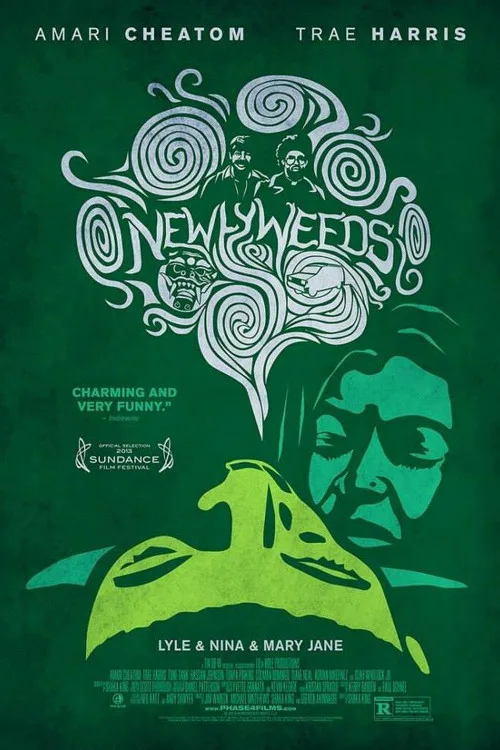“Newlyweeds” is a film out of its time. Will audiences have the patience for it—or even know how to watch it? I hope so, because it’s a special movie. Odd, disjointed and not entirely coherent, but special.
You could describe it as an indie drama about a furniture repo man named Lyle (Amari Cheatom) and a museum tour guide named Nina (Trae Harris), and how their pot dependence bonds them to each other but keeps them from advancing in life. You could also compare it to Spike Lee’s “She’s Gotta Have It,” not just because it concentrates on a predominantly African-American slice of Brooklyn’s single community, but because writer-director Shaka King, like Lee before him, has the eye of a poet but the sensibilities of a journalist and seems content to leave it at that. He doesn’t seem too interested in telling a neatly interwoven story in which one thing leads to another, and it all builds to a neat, satisfying conclusion.
But in a film about stoners, a certain feeling of inertia might be inevitable, and “Newlyweeds” embraces it. It’s expertly written, directed, shot, acted and edited, and even though it wears out its welcome about halfway through, there’s always something fascinating to look at or listen to, plus a sense of promise that lends the whole project more goodwill than it might otherwise inspire.
This is a film of vignettes, many of which feel as self-contained as shorts or sketch comedy bits. Lyle and his partner Jackie (Tone Tank) devise convoluted schemes to repossess a couch or a refrigerator and carry them out with the “Seriously, like that would actually work?” bravado of 1970s TV cops playing dress-up. At one point Lyle poses as a guy who could be an Afrocentric jazz philosopher, his obviously phony beard and mustache dangling from his face like curtain fringe. Lyle and Nina smoke and smoke and smoke as they talk about the present and future of their relationship, including the trips they may never take together (“How we supposed to go to the Galapagos if you’re buying a bag every two minutes?” she asks him). There are effective slapstick set pieces: Nina being mortifyingly careless with a bag of pot brownies; an exasperated, weed-craving Lyle wandering the neighborhood for bud and being mistaken for a crackhead, and a mordantly funny jail cell scene that evokes the counterculture-infused comedies of Robert Downey, Sr. and the early underground comix of R. Crumb.
There’s a story, or an implied story, or maybe a psychological condition holding everything together, sort of: Lyle and Nina can’t recognize or admit how much time, money and emotion they’re investing in their drug of choice, and how it encourages them to mistake contemplation for introspection. Marijuana frees the imagination, but the roaming mind doesn’t always travel to new or useful places. A lot of the time it just indulges in mental masturbation, some of it colorful and entertaining (Lyle’s Blaxploitation fantasy, for example), the rest pointless or debilitating. One of the most unnerving scenes finds Lyle hate-staring at Nina, who has let a talkative, insistent yet oddly ingratiating coworker named Chico (Colman Domingo) come home with her and share some potent hash. The movie fixates on the two as seen by the stoned, jealous Lyle: the mix of slow-motion, hellish red lighting and bizarrely elongated expressions makes it seem as though their faces are morphing into African masks, like one that Nina wears for Lyle earlier in the film.
This is a movie about stoners rather than a stoner movie. It’s not “Smiley Face” or a Harold and Kumar comedy and isn’t trying to be. It has surreal or dark passages, and a mature attitude toward the main couple’s drug use that somehow never becomes moralistic.
But overall, the tone is light and playful. “Newlyweeds” is less a grand statement than a playground for its talented performers and filmmakers, including the great character actor Isaiah Whitlock, Jr., who has a sidesplitting cameo as a jailhouse joker, and cinematographer Daniel Patterson, whose elegant but unfussy lighting and elaborately choreographed Steadicam shots contribute to the aura of confidence. King has a good ear as well as a sharp eye. The people in this film don’t all talk the same way, and the best dialogue seems eavesdropped on. (“This buddy of mine, this little Inuit dude, he was four feet tall,” Chico tells Nina. “He wrestled an elk.”) “Newlyweeds” is a likable collection of bits that don’t really lead anywhere, but the people who made it are going places.




















